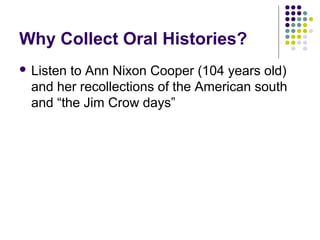Historical comparative research
- 2. Famous Examples Karl Marx and Capital (1867) Emile Durkheim and Suicide (1897) Max Weber and The Protestant Ethic and the Spirit of Capitalism (1905) C. Wright Mills on history in the Sociological Imagination (1959) “Let us not forget what it is we are studying and how little we know of man, of history, of biography, and of the societies of which we are at once creatures and creators”
- 3. Value of Historical Research It throws light on present and future trends. It enables understanding of and solutions to contemporary problems to be sought in the past. It can illuminate the effects of key interactions within a culture or sub-culture. It allows for the revaluation of data in relation to selected hypotheses, theories and generalizations that are presently held about the past and the present.
- 4. Steps in a Historical-Comparative Research Project 1. Conceptualization of an idea, topic, or research question 2. Locate evidence and do background literature review 3. Evaluate evidence 4. Organize evidence 5. Synthesize evidence and develop general explanatory model 6. Develop a narrative exposition of the findings
- 5. Data Sources Primary Sources: first-hand or eyewitness observations of phenomenon Secondary Sources: second-hand observation, i.e. the author collected the data from eyewitnesses. Running Records Statistics, gov’t data Recollections
- 6. What is Oral History? Video clip: The Oral History Research Method
- 7. Oral History Oral history interviewing is valuable for history, anthropology, and folklore. Collects information about the past from observers and participants in that past. Gathers data not available in written records about events, people, decisions, and processes. Can show how individual values and actions shaped the past, and how the past shapes present-day values and actions. Methodological problem: Oral history interviews are grounded in memory, and memory is a subjective instrument for recording the past, always shaped by the present moment and the individual psyche.
- 8. Why Collect Oral Histories? Listen to Ann Nixon Cooper (104 years old) and her recollections of the American south and “the Jim Crow days”
- 9. Evaluating Sources External Criticism: Appraises the authenticity and authorship of the data source Internal Criticism: Appraises the meaning and intent of the data source
- 10. Types Of Historical Research A. Historical Events Research examines particular events or processes that occurred over short spans of time Methodological problems Meanings may have changed Information may not be complete
- 11. Types (cont.) B. Historical Process Research focus on how and why a series of events unfolded over some period of time Methodological problems: May place too much emphasis on the actions and decisions of particular actors Not always clear which example represents general pattern definitions may change over time relies on long-term records and archives
- 12. Types (cont.) C. Cross-Sectional Comparative Research comparing two or more social settings or groups (usually countries) at one particular point in time Methodological problems: comparability of measures across countries
- 13. Types (cont.) D. Comparative Historical Research combines historical process research and cross-sectional comparative research To understand causal processes at work within particular groups and to identify general historical patterns across groups Methodological problems: history has not been recorded accurately or reliably difficult to know how to deal with exceptions difficult to conclude that one factor (and not others) is what causes some outcome groups being compared may not be independent (Galton’s Problem)
- 14. Equivalence in Historical Research How can we make comparisons across diverse contexts (both in time and geography)? Lexicon equivalence Contextual equivalence Conceptual equivalence Measurement equivalence
- 15. Weaknesses of Historical Method 1. Bias in interpreting historical sources. 2. Interpreting sources is very time consuming. 3. Sources of historical materials may be problematic 4. Lack of control over external variables
- 16. Strengths of Historical Method 1. The historical method is unobtrusive 2. The historical method is well suited for trend analysis. 3. There is no possibility of researcher- subject interaction.
- 17. Interesting Internet Sites on Historical Research Library and Archives Canada http://www.bac-lac.gc.ca/eng/Pages/home.aspx Where To Do Historical Research (Links) http://www.wheretodoresearch.com/History.htm Oral History Digital Collection Youngstown State http://www.maag.ysu.edu/oralhistory/oral_hist.html Oral History Project List Columbia University http://www.columbia.edu/cu/lweb/indiv/oral/projects.html

















